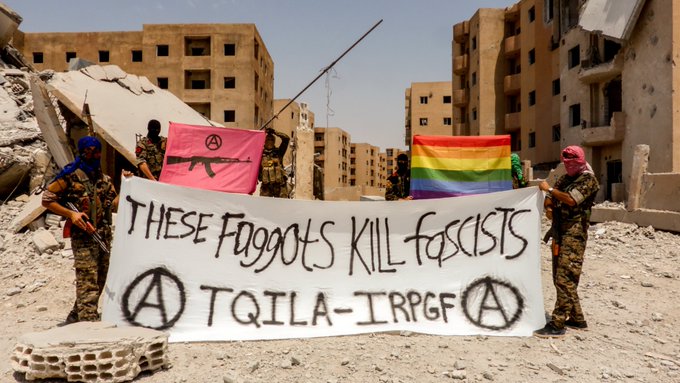FIRST LGBT UNIT 'CREATED TO FIGHT ISIS' IN SYRIA.
اولین گروه/واحد از 'همجنسگرایان زن و مرد و دو جنسیتی و ترنس' برای مبارزه با داعش در سوریه ایجاد شد. نام آن؟ ?
THE QUEER INSURRECTION
شورشگرایان همجنس گرا
http://www.newsweek.com/first-lgbt-unit-created-fight-isis-syria-its-name-queer-insurrection-641148
LGBT supporters are fighting back against the Islamic State militant group (ISIS) on the Syrian battlefield after three years of persecution in which their community suffered stonings, executions from rooftops and a deadly shooting at an LGBT nightclub in Orlando, Florida.
A group of international volunteers fighting with Kurdish forces against ISIS in northern Syria have declared the first LGBT military unit created to battle the jihadi group. Its name? The Queer Insurrection and Liberation Army, or TQILA. The International Revolutionary People's Guerrilla Forces (IRPGF), an anarchist movement, announced the group's creation Monday.
IRPGF is a unit in the International Freedom Battalion, a collection of foreign fighters who traveled to northern Syria to battle ISIS alongside the Kurdish militia known as the YPG, or People’s Protection Units. It was only set up in April, two months ahead of the final stage of a Kurdish-Arab offensive backed by the U.S.-led coalition to liberate the eastern Syrian city of Raqqa.
A statement posted by the group on Twitter said its members “seek to smash the gender binary and advance the women’s revolution as well as the broader gender and sexual revolution.”
It remains unknown how many personnel will be involved in the unit, and how many are members of the LGBT community. Heval Rojhilat, spokesperson for TQILA, speaking to Newsweek, would not reveal numbers for security reasons.
"Many of our comrades are within the LGBT*QI+ community," Rojhilat says. "We are already fighting in Raqqa."
The group responded to a comment on Twitter, saying it pronounced the new unit’s name as “Tequila.”
The group was formed as its members had “watched in horror as fascist and extremist forces around the world have attacked the Queer community and murdered countless of our community members citing that they are ‘ill,’ ‘sick,’ and ‘unnatural.’”
The statement, using an Arabic acronym for ISIS, continues: “The images of gay men being thrown off roofs and stoned to death by Daesh was something we could not idly watch.”
The statement ends with the slogan: “Shoot back! These faggots kill fascists!” The group’s logo is a black AK-47 machine gun on a pink background.
ISIS’s Sharia courts have declared homosexuality to be a capital offense, one deserving of severe and deadly punishment.
After Omar Mateen launched a shooting attack at the Pulse nightclub in Orlando in June 2016, killing 49 people and pledging allegiance to the group’s leader, Abu Bakr al-Baghdadi, in a 911 phone call, ISIS claimed responsibility. It said in a statement circulated by its Amaq news agency that he had “targeted a nightclub for homosexuals.” Homosexuality is itself a taboo subject in Syria and Iraq.
Since its rise to prominence in Iraq in mid-2014, ISIS has released a slew of propaganda images and footage that show men accused of being homosexuals blindfolded and thrown from buildings in front of large crowds. If those thrown from buildings survived, they were then stoned to death by the spectators, who live in the group’s self-styled caliphate that straddles the Iraqi-Syrian border..
When suspected members of the community are captured, ISIS fighters went through their contact books to track down other people they believed to be gay, according to accounts of members of the LGBT community who lived under ISIS. Over three years, dozens of LGBT people were killed under ISIS’s rule, and many others fled.
In its statement, TQILA also accuses Christian conservatives of attacking the LGBT community.
But Kurdish forces treat women and men equally in its ranks, something not seen in many militaries across the world. They also have all-Kurdish women units and even recently set up training academies in the hope of creating the first all-Arab women unit in its forces.
The TQILA statement says there is a “revolution in Rojava,” in reference to the semi-autonomous region in northern Syria that the Kurds hope to create. It will welcome all peoples and serve as a functioning democracy in a region more accustomed to theocracy and autocracy.
The Kurdish-Arab coalition, known as the Syrian Democratic Forces, of which the YPG is a dominant player, is besieging ISIS in its de facto capital of Raqqa in eastern Syria. The SDF forces have captured more than a quarter of the city's neighborhoods, wrestling them back from ISIS despite the threat of suicide car bombs, sniper fire and booby traps.
If the jihadi group loses Raqqa, it would mark the end of its control of the largest population center in its possession after the fall of Mosul in northern Iraq earlier this month. The group still controls the eastern Syrian cities of Deir Ezzor and al-Mayadin.
It is unclear how deeply entrenched the LGBT unit is in the battle for Raqqa. But if the new battalion can help deal one of the final blows to the caliphate, it would be the sweetest of victories for members of the LGBT community who have suffered at the hands of ISIS. In that event, the group plans to mark the community where the symbols of ISIS once stood, Rojhilat says. "We will fly TQILA's flag, the IRPGF's flag and the rainbow flag!"



No comments:
Post a Comment